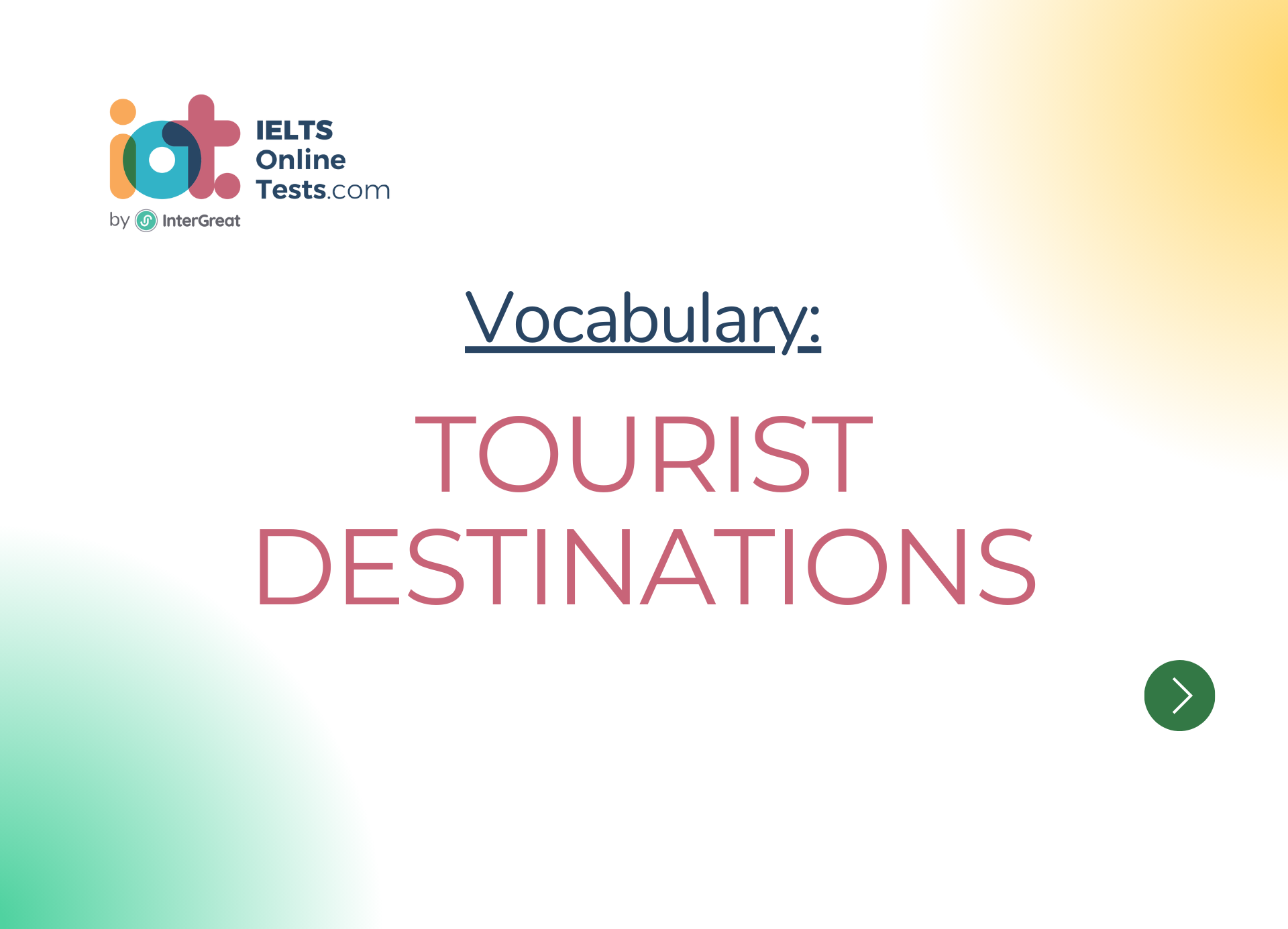
Tourist destinations
Below is a detailed list of vocabulary related to "Tourist destinations" suitable for IELTS band 6.5-8.0:
Tourist Destination:
- Definition: A place that attracts visitors from other regions or countries for leisure, recreation, or cultural experiences.
Landmark:
- Definition: An iconic or famous feature or monument in a destination that is recognized and visited by tourists.
Attraction:
- Definition: A place or site that draws interest and attention from visitors due to its unique features or historical significance.
Sightseeing:
- Definition: The activity of visiting famous or interesting places as a tourist.
Cultural Heritage:
- Definition: The traditions, customs, and historical artifacts that are passed down from generation to generation in a society or region.
Historical Site:
- Definition: A location that has significant historical importance and is preserved for tourism and educational purposes.
Natural Wonders:
- Definition: Spectacular and unique natural formations, such as waterfalls, caves, or mountains, that attract tourists.
Architectural Marvels:
- Definition: Impressive and remarkable buildings or structures that are admired by tourists for their design and construction.
Museum:
- Definition: An institution that collects, preserves, and exhibits objects and artifacts of cultural, historical, or scientific significance.
Gallery:
- Definition: A place that displays and sells works of art, such as paintings, sculptures, or photographs.
National Park:
- Definition: A protected area of natural landscapes and wildlife, open to the public for recreation and conservation.
Beach Resort:
- Definition: A coastal area with facilities and accommodations for tourists to relax and enjoy recreational activities.
Eco-Tourism:
- Definition: Tourism that promotes responsible travel to natural areas, with a focus on conservation and local communities.
Adventure Tourism:
- Definition: Travel that involves physical activities and challenges, such as hiking, rafting, or mountain climbing.
Cruise:
- Definition: A journey on a ship or boat, often for leisure and sightseeing purposes.
City Tour:
- Definition: A guided excursion around a city to explore its main attractions and landmarks.
Local Cuisine:
- Definition: The traditional food and dishes of a region or country that tourists often seek to try.
Shopping District:
- Definition: An area with a concentration of shops and boutiques that attracts tourists looking for souvenirs and unique items.
Nightlife:
- Definition: Entertainment and social activities available in a city or town after dark, including bars, clubs, and live music venues.
Cultural Festivals:
- Definition: Events that celebrate the traditions, music, dance, and cuisine of a specific culture or community.
Tourist Guide:
- Definition: A person who provides information and assistance to tourists visiting a destination.
Tour Package:
- Definition: A pre-arranged tour with a fixed itinerary and included services, such as accommodation and transportation.
Travel Itinerary:
- Definition: A detailed plan and schedule of activities for a trip, including dates, times, and locations to be visited.
Local Guidebook:
- Definition: A book or publication providing information about a specific destination, including maps, attractions, and recommendations.
Tourist Souvenir:
- Definition: A memento or keepsake purchased by tourists as a reminder of their visit to a particular destination.
Hospitality Industry:
- Definition: The sector that includes hotels, restaurants, and other services catering to the needs of tourists.
Travel Insurance:
- Definition: Coverage that protects travelers against unforeseen events and emergencies during their trip.
Transportation Options:
- Definition: Various modes of travel available to tourists, such as trains, buses, taxis, or rental cars.
Tourism Infrastructure:
- Definition: The facilities and services that support tourism, such as airports, roads, and accommodation.
Language Barrier:
- Definition: Difficulties that arise from not being able to communicate effectively in the local language of a destination.
Local Customs:
- Definition: The traditions, behaviors, and practices specific to the culture of a particular region or country.
Tourist Flow:
- Definition: The movement of tourists into and within a destination, often influenced by seasons and events.
Tourism Revenue:
- Definition: The income generated from tourism-related activities, including spending on accommodation, dining, and attractions.
Sustainable Tourism:
- Definition: Tourism practices that aim to minimize negative impacts on the environment and local communities.
Cultural Exchange:
- Definition: The sharing of cultural experiences between tourists and the local population, fostering mutual understanding.
By incorporating these vocabulary words into your studies and practice, you can enhance your language proficiency and be better prepared for the IELTS exam. Best of luck!




